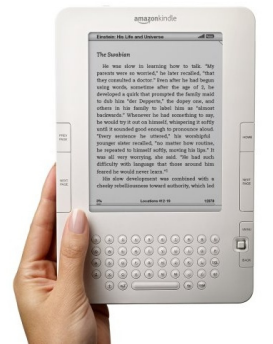By Alex Watkins (The Cascade) – Email
Date Posted: September 27, 2011
Print Edition: September 21, 2011
Committed book lovers take note: Amazon is now working on a project that could permanently change the way we experience literature. The company informed the Wall Street Journal this September that it was negotiating with publishers to create a digital book renting service similar to Netflix, in which customers would potentially be able to pay a set fee for either unlimited access to the company’s archives or a set amount of rentals per month. CBC Radio’s technology columnist Dan Misener noted that this possibility was just part of a growing trend known as “access economy,” which, in short, “emphasizes access to products and services over ownership.”
News of access economy’s encroachment on the printed word has me wondering: will it do to books what it’s doing to film? After all, the ease of access and massive library of titles offered by web-based companies like Netflix (and potentially Amazon’s site) are features that can’t possibly be matched by storefront-based operations. In fact, Netflix is often directly cited as a cause for the closure of movie stores nationwide, and even the bankruptcy of Blockbuster.
The idea that online services could bring the decline of the book store as well is genuinely unsettling to me – and it’s not just because I am generally lacking in technological ability. It’s because I am a bona fide book lover – and an uncontrollably greedy one, at that: I love not just the contents of books, but the sheer spectacle of them. Few things thrill me more than poring over someone’s bookcase; it excites a specific breed of envy and desire that I otherwise rarely feel.
It is here that, for me, access economy overlooks something major: the thrill of building some kind of tangible collection. Filling a bookshelf is like accumulating all the odds and ends of one’s first house: the process itself brings a certain amount of excitement and satisfaction. The contents of a bookshelf map both one’s growth as a person and as a reader over time.
In a related vein, perhaps the best argument against digitalization and for the printed and bound word is that, quite simply, books are sexy. A well-stocked bookshelf in a partner’s home – for the text-obsessed, at least – is an object of lust. It is brain lingerie, allowing the viewer a subtle look under the surface, revealing something of their tastes and preferences without giving away the whole shebang. And a home library is impressive in a way that paid monthly access to a global one is not; I will admit to having been immensely more attracted to certain partners after perusing their collections, and although this is quite possibly very shallow it is at least more amusingly so than interest sparked by demi-god cheekbones or a firm little behind.
Digital access is practical (and yes, it is certainly environmentally responsible), but it is not romantic, and it is not sexy. Furthermore, it is an attack on the readers’ sense of community; looking up a recommended book title online is entirely removed from the experience of pressing a book into another enthusiast’s hand, trusting (perhaps against better judgment) that it will find its way safely back. Sure, one can claim that in conjunction with social media, digitalizing books can make for the same kind of shared experience, but in practice, this is not the case; for example, Netflix removed two different social networking features from its website (one in September 2010 and in January 2011), noting that they were rarely used.
With all this in mind, I hope I’m not alone in declaring that, unbalanced romantic though I may be, I plan on eschewing the digitalization of literature in favour of a home library. I don’t care about the extra space in my bedroom, and frankly I don’t give a damn about the virtues of access economy – what I want is a personal relationship with books, and with others who love them.


